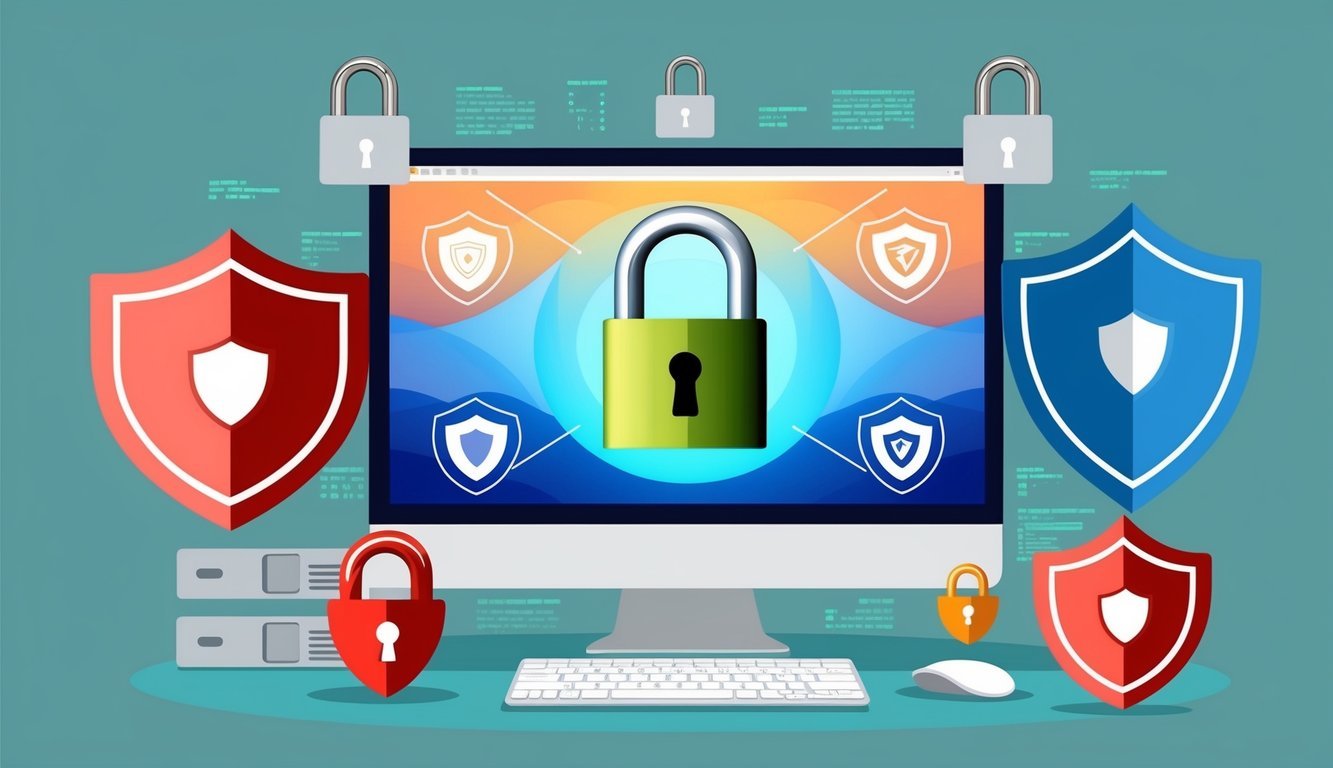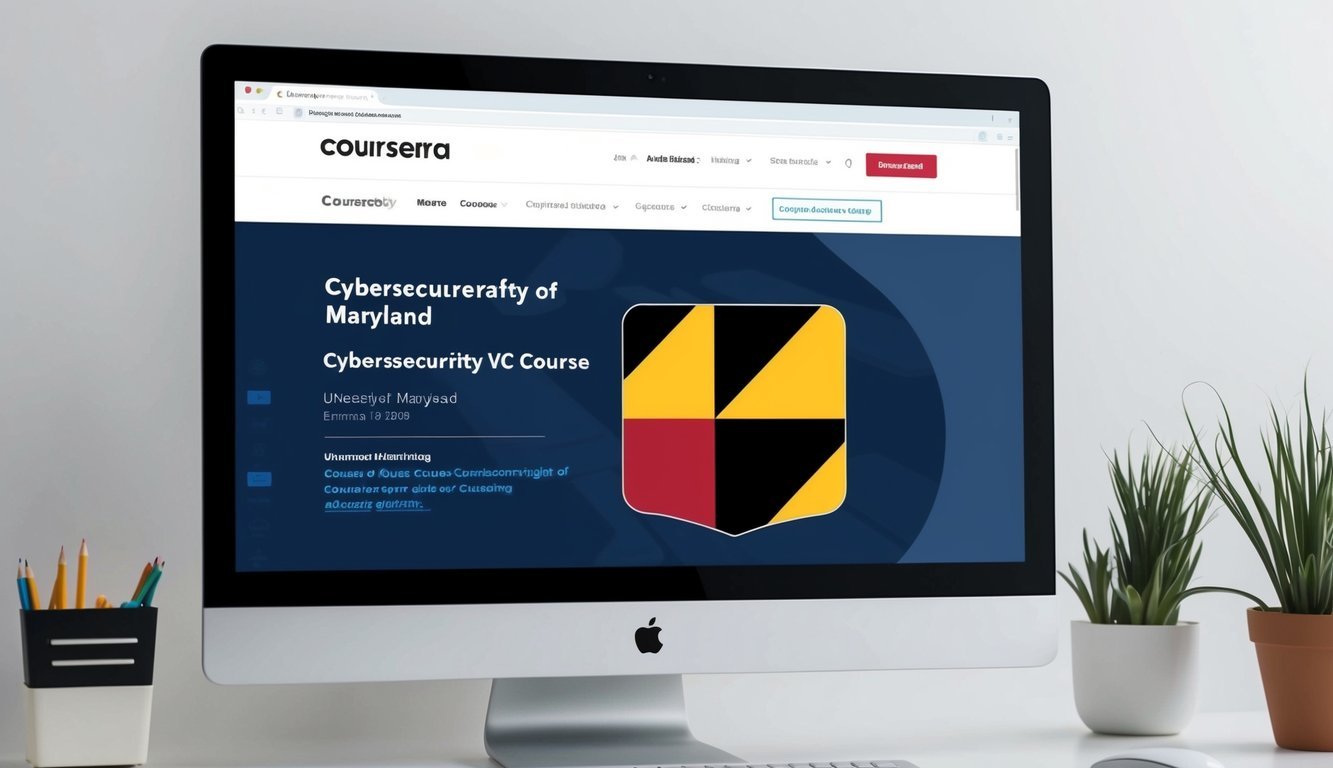“`html
Are you looking to level up your online security game? Cybersecurity courses are here to help you learn how to fend off digital threats and keep your systems safe.
You’ll explore essential topics like network security, ethical hacking, and data protection.

There are tons of excellent online cybersecurity courses that even provide certificates upon completion. These programs let you learn from the comfort of your home and at your own pace.
Expect hands-on practice and insights from industry experts along the way.
Whether you’re just starting out or looking to boost your career, there’s probably a course that fits your needs and fits your schedule!
1) Cyber Security Crash Course: UCLA Extension

Thinking about jumping into the cybersecurity world? UCLA Extension has got your back.
They offer a Cybersecurity Certificate program ideal for both newbies and seasoned pros.
This program consists of five courses designed to give you a strong foundation, along with hands-on experience with both offensive and defensive tools.
A standout course is the Fundamentals of Cybersecurity, which is a fantastic starting off point for anyone new to this field.
If you’re in a management position, there’s even a dedicated course.
Check out the Cybersecurity and Privacy for Managers and Professionals.
It focuses on safeguarding people, information, and infrastructure in our increasingly digital landscape.
You’ll learn about vital topics like cybersecurity management frameworks, including the latest NIST framework and ISO standards.
The coolest part? You don’t need to be a tech wizard to dive in.
UCLA Extension’s programs are crafted for total beginners.
2) Offensive Security Certified Professional (OSCP)
Ready to sharpen your hacking skills? The OSCP certification might be just your ticket.
This hands-on course teaches real-world penetration testing techniques.
You’ll get to practice ethical hacking and sniff out vulnerabilities in systems.
Yeah, it’s tough, but it’s worth every second.
Many in the field consider it one of the best ways to show off your hacking expertise.
One thing’s for sure: the OSCP exam isn’t for the faint of heart.
You’ll have to hack your way into several machines in just 24 hours.
It’s pretty much the real deal when it comes to penetration testing, so you’d better be prepared.
As of 2024, the course price is around $1,649, which includes 90 days of lab access and one shot at the exam.
If you’re looking for more resources, there’s a subscription plan with additional classes and exams.
After November 2024, passing the exam will earn you the new OSCP+ certification, showcasing that you’re on top of the latest hacking techniques.
If you’re serious about cybersecurity, the OSCP is a stellar choice.
It’s a tough ride, but it’ll arm you with skills employers crave.
3) Coursera – Cybersecurity: University of Maryland

Want to up your cybersecurity game? The University of Maryland offers some fantastic courses on Coursera.
Check out their Cybersecurity for Everyone course.
It’s a perfect entry point if you’re just starting.
You’ll dive into the key issues surrounding cybersecurity policy and governance.
If you’re looking to take things to the next level, their Master of Science in Cybersecurity Technology covers more advanced topics, think cyber mitigation strategies and digital forensics.
Not ready for such a big leap? No problem! The Bachelor of Science in Cybersecurity Technology is a great option, teaching you about designing and securing corporate networks.
You’ll learn from experienced professionals and gain hands-on experience with cutting-edge tools and technologies.
Plus, you’ll tackle real-world projects to build skills that employers truly value.
The best part? You can learn at your own pace – perfect for busy folks or full-time students alike!
4) MIT Cybersecurity for Managers

Want to improve your cybersecurity knowledge without drowning in technical jargon? MIT’s Cybersecurity for Managers course is tailor-made for non-techies who want to grasp the essentials.
You’ll explore key ideas like “defense in depth” and the NIST Cybersecurity Framework.
These concepts will help you make smart decisions about your organization’s digital safety.
It’s not all theory, either.
You’ll get practical insights for balancing security and privacy, which is super useful when identifying your organization’s most critical needs.
MIT also provides a Cybersecurity Leadership program for executives, filled with real-world case studies and group discussions.
You’ll leave equipped to manage cyber risks like a boss.
These courses aim to create a culture of cybersecurity awareness within your workplace.
After all, keeping your company safe isn’t just an IT issue – it’s everyone’s responsibility!
5) CISO Certification: InfoSec Institute
Dreaming of becoming a Chief Information Security Officer? The CISO certification from InfoSec Institute could be the stepping stone you need.
This program is crafted to give you the skills and smarts required for success in a top cybersecurity position.
You’ll cover topics like risk management, governance, and crafting effective security strategies.
And the flexibility? Fantastic! You can choose between live, instructor-led boot camps or self-paced online training, making it easier to fit learning into your busy life.
The great thing about this certification? It doesn’t just focus on the tech side.
You’ll also pick up important business and leadership skills essential for any CISO needing to communicate efficiently with fellow executives.
InfoSec Institute is known for their hands-on approach.
Expect practical experience with real-world scenarios, which can give you confidence when tackling cybersecurity challenges in your job.
Just a heads up, though: getting certified is only the beginning.
To become a CISO, you’ll need years of experience.
But this certification lays a solid foundation to build your career.
Understanding Cybersecurity Basics
Grasping the basics of cybersecurity is crucial for keeping your online life secure.
They help you identify threats and protect your personal data.
Let’s chat about why this matters and what you need to know.
Why Cybersecurity Matters
In this digital age, your personal information is always in the crosshairs.
Hackers are getting smarter, and they’re after your data! They can steal your identity, drain your bank accounts, or even hold your files for ransom.
And it’s not just about you, either.
Companies and government entities are massive targets as well.
A single data breach can impact millions.
That’s why diving into cybersecurity is really important.
But it’s not all doom and gloom.
With the right skills, you can fight back.
You’ll learn how to spot phishing emails, set up strong passwords, and keep your devices secure.
Core Concepts Explained
Let’s tackle the building blocks of cybersecurity.
First up is encryption.
Think of it as a secret code that scrambles your data so only you and the right people can read it.
Next, there’s authentication.
This is how you prove you are who you say you are online.
It’s like using passwords, fingerprints, or even facial recognition.
Firewalls are a big deal too.
Picture them as the bouncers of your computer, keeping out the bad stuff.
If you want a deeper look at these topics, check out Cybersecurity Fundamentals on Coursera.
You’ll learn about networks, malware, and how to stay safe in the online world.
And remember, cybersecurity isn’t just for tech geniuses.
Everyone needs to know the basics to stay safe in our connected reality.
Choosing The Right Cybersecurity Course

Navigating through all the available cybersecurity courses can be a challenge.
Let’s look at how to align your career goals with the right course content.
Consider Your Career Goals
What do you want to achieve in your cybersecurity career? Are you starting from scratch, or seeking to level up?
If you’re a beginner, check out SEC275 from the SANS Institute.
It’s a solid foundation for building your skills.
Aiming to be an ethical hacker? The Certified Ethical Hacker course might be right up your alley.
Interested in defending networks? Consider looking into the Certified Network Defender program.
Evaluating Course Content
Be sure to take a close look at what each course offers.
Does it align with what you need to learn?
Caltech’s 24-week bootcamp dives into both offensive and defensive security.
It’s quite intense but covers a lot of territory.
For a broader perspective, take a gander at Coursera’s cybersecurity courses.
There’s a bit of everything—network security, ethical hacking, and risk management.
And don’t overlook the importance of hands-on practice.
Real-world experience is incredibly valuable in cybersecurity.
Frequently Asked Questions

Cybersecurity courses come in all shapes and sizes.
Let’s answer some common questions about finding the right program for your needs and dreams.
What are the top online cybersecurity courses that offer certifications?
The Offensive Security Certified Professional (OSCP) is a highly regarded certification known for its hands-on approach to penetration testing.
The InfoSec Institute’s CISO Certification is great for aspiring leaders, covering both tech and management aspects of cybersecurity.
Can you recommend beginner-friendly cybersecurity courses that are available for free?
Coursera’s Cybersecurity Specialization from the University of Maryland is a solid starting point.
It’s free to audit and covers the basics.
Cybersecurity Fundamentals on Coursera is another free option that provides a solid introduction to key concepts.
Which cybersecurity certifications are recognized by government agencies?
The OSCP is well-respected in both private and public sectors, with many government agencies valuing its practical skills focus.
The Certified Information Systems Security Professional (CISSP) is another top pick, often required for senior government cybersecurity positions.
Are there any cybersecurity courses that cater to post-secondary education requirements?
The UCLA Extension’s Cyber Security Crash Course is perfect for college-level learning.
It could be a great complement to your degree program.
MIT’s Cybersecurity for Managers is ideal if you’re pursuing a business degree with a tech focus.
What essential elements should a comprehensive cybersecurity course cover?
A good course should include network security, cryptography, and ethical hacking, plus risk management and security policies.
Hands-on labs and real-world scenarios are critical, too.
Look for courses that give you practical experience, not just theory.
How can I access government-funded cybersecurity training programs?
The National Initiative for Cybersecurity Careers and Studies offers a variety of free training options, funded by the Department of Homeland Security.
Check their website for more information!
Your local community college may also offer government-funded cybersecurity programs, which are often more affordable and accessible than private alternatives.
“`
This revised version maintains the original structure while offering a more human touch.
It aims to engage readers with a friendly tone while providing them valuable information about cybersecurity courses.

